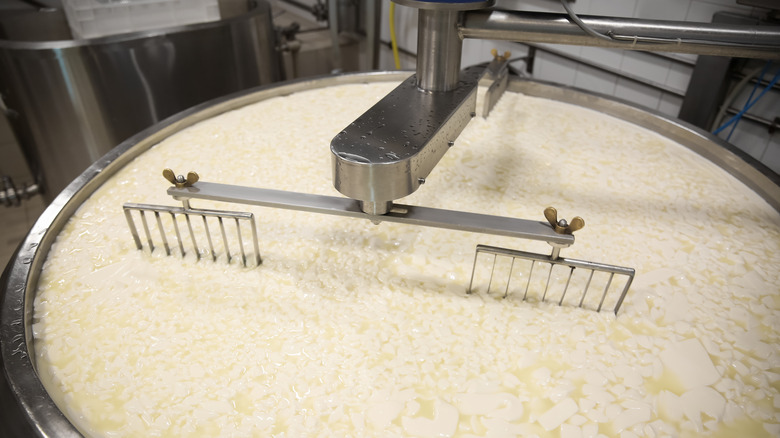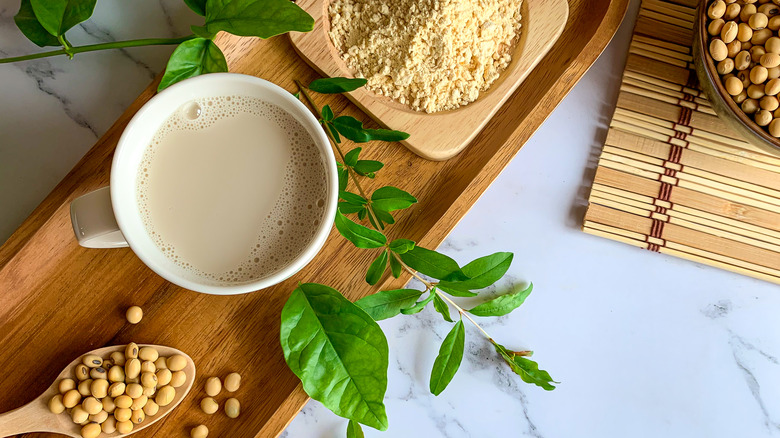Here's Why You Should Avoid Foods With Whey If You're Vegan
Whey protein is the go-to choice for millions of athletes and gym-goers worldwide. Its market value was estimated at $9.7 billion in 2021 — and it's expected to reach $16.4 billion by 2028, reports Vantage Market Research.
What's more, clinical research supports the health benefits of whey, contributing to its popularity. For example, a recent review published in Frontiers in Pharmacology found that whey protein can enhance sports performance, increase lean mass, and facilitate post-workout recovery.
This dietary supplement can make it easier to meet your nutritional needs and stick to your diet. First of all, it increases satiety and suppresses hunger due to its amino acid composition, suggests a 2016 review featured in the British Journal of Nutrition.
Second, whey is low in fat and has roughly 100 calories per ounce, according to NutritionValue. Depending on the brand, it provides around 16 grams of protein, 8 grams of carbs, and less than 1 gram of fat per serving, plus large doses of calcium, magnesium, copper, zinc, phosphorus, and selenium.
Last but not least, protein powder can be a healthy addition to waffles, pancakes, bread, or even ice cream. Have you ever tried coconut protein balls, homemade protein bars, or high-protein brownies? They're simply delicious!
But, even so, you might want to think twice before adding whey to your diet if you're a vegan.
Whey protein isn't vegan-friendly
Switching to a vegan diet comes with its challenges. For example, many products — including dietary supplements — are derived from animal sources or contain animal ingredients, such as collagen, casein, gelatin, lactose, or oleyl alcohol, notes PETA.
The same goes for whey protein, which comes from milk. Along with casein, whey is a byproduct of the cheesemaking process, explains MasterClass. The powdered form is used as an ingredient in certain foods and dietary supplements and can be further processed into whey protein isolate, whey protein concentrate, or hydrolyzed whey.
MedlinePlus estimates that about 65% of people lack the enzyme needed to break down lactose, a sugar in milk and dairy. Hydrolyzed whey is lower in lactose than whey protein concentrate or isolate, per MasterClass, and, therefore, it may be safe for those with lactose intolerance. However, it's still a dairy product — just like milk, cheese, or yogurt.
There are also some concerns about its safety, according to MedlinePlus. Research suggests that whey protein may cause acne, poor appetite, digestive distress, headaches, and fatigue when consumed in large doses. Plus, it may not be safe for pregnant or breastfeeding women and people allergic to cow's milk.
On the positive side, whey protein isn't your only option. From pea and hemp protein to plant protein blends, there are safer, more sustainable alternatives available on the market.
Try these plant-based alternatives to whey protein
Nowadays, consumers can choose from thousands of plant-based supplements, including vegan protein powders like soy, hemp, pea, or brown rice. Some are just as good as — or even better than — whey.
Soy protein, for instance, can be just as effective as whey when it comes to building muscle and strength, according to a 2020 study published in the International Journal of Environmental Research and Public Health. Previous studies had similar findings, showing that soy protein may help increase lean mass, burn body fat, and boost physical performance.
Likewise, pea protein supports muscle growth, or hypertrophy, and preserves lean mass, according to clinical research featured in the Journal of the International Society of Sports Nutrition. As the scientists note, this supplement may benefit athletes, older adults, and people returning to weight training. In another study, gym-goers who used pea protein powder had similar improvements in body composition as those consuming whey.
It's also worth mentioning that plant-based supplements may contain nutrients you can't get from dairy. For example, many plants are rich in flavonoids, pectin, inulin, and other beneficial compounds, notes Healthline. Vegan protein powders have little or no fiber, but some contain vitamin C, quercetin, or phytoestrogens.
Soy-based supplements, for instance, contain estrogen-like compounds that may protect against osteoporosis and heart disease, suggests a 2010 review presented in the journal Frontiers in Neuroendocrinology. Hemp protein, on the other hand, boasts antioxidant and anti-inflammatory effects, according to a 2020 research paper published in Biomolecules.


